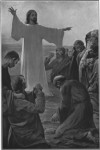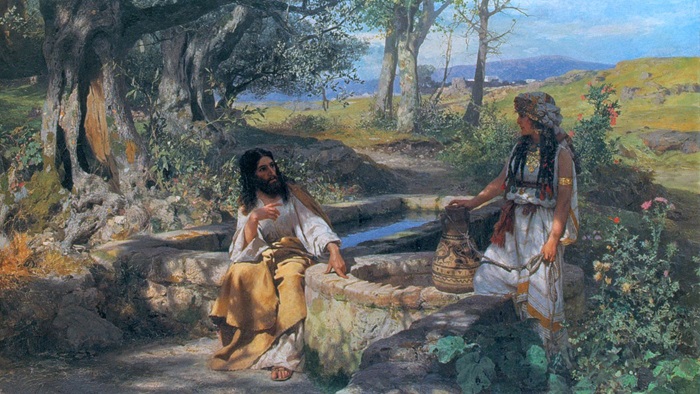From John 3-4
 Nothing satisfies a persons thirst better than cool water. In today’s passage Jesus goes to an unlikely place and meets a Samaritan woman at a well. He offers her living water. Water that wells up to eternal life. He invites people to ask him for this living water. He will give it.
Nothing satisfies a persons thirst better than cool water. In today’s passage Jesus goes to an unlikely place and meets a Samaritan woman at a well. He offers her living water. Water that wells up to eternal life. He invites people to ask him for this living water. He will give it.
This post is part of my bible in a year series.
Passage and Comments
Throughout Jesus’ ministry, his disciples baptised others. So did John the Baptist and his disciples. Having started before Jesus, John initially had more people coming to him. But over time more and more came to Jesus. John accepted it was from God (Jn 3.22-36), but when Jesus heard of the Pharisees knew of his growing popularity, he left Judea for Galilee. On the way he had to pass through Samaria and there he has an unusual conversation in the middle of the day.
7 A woman from Samaria came to draw water. Jesus said to her, “Give me a drink.” 8 (For his disciples had gone away into the city to buy food.)
9 The Samaritan woman said to him, “How is it that you, a Jew, ask for a drink from me, a woman of Samaria?” (For Jews have no dealings with Samaritans.) (Jn 4.7-9)
‘A woman came to draw water’. Generally people drew water out accompanied by a group of people. The fact the woman is by herself says something about her status in her community.
‘Give me a drink’. Jesus initiates a conversation with the woman asking for a drink of water. Jews believed Samaritans were unclean. Samaritan woman more so. The woman recognises the irregular nature of Jesus’ request.
Jesus breaks social and religious boundaries in speaking to the Samaritan woman.
10 Jesus answered her, “If you knew the gift of God, and who it is that is saying to you, ‘Give me a drink,’ you would have asked him, and he would have given you living water.”
11 The woman said to him, “Sir, you have nothing to draw water with, and the well is deep. Where do you get that living water? 12 Are you greater than our father Jacob? He gave us the well and drank from it himself, as did his sons and his livestock.” (Jn 4.10-12)
Jesus speaks to her of spiritual realities. She responds assuming he is talking about earthy realities.
‘Gift of God’, ‘Who it is saying to you’, ‘He would have given you’. Jesus says if she knew who he was she would have been the one who asked Jesus for living water and Jesus would have given it to her. Jesus later identifies the water as the gift of the Spirit (Jn 7.38-39).
Jesus is open to anyone’s request for living water. He will give it.
‘Sir you have nothing to draw water with’. She does not know where Jesus will get the living water from or what he means by it. So Jesus explains what he means a little further.
13 Jesus said to her, “Everyone who drinks of this water will be thirsty again, 14 but whoever drinks of the water that I will give him will never be thirsty again. The water that I will give him will become in him a spring of water welling up to eternal life.”
15 The woman said to him, “Sir, give me this water, so that I will not be thirsty or have to come here to draw water.” (Jn 4.13-15)
‘Never be thirsty again’. Jesus explains the water he offers will permanently satisfy the person who drinks it.
This water will become a spring of water which will give eternal life. Ask Jesus for his water.
‘Sir, give me this water‘. The woman believes Jesus and wants the water he offers. She recognises its supernatural value.
16 Jesus said to her, “Go, call your husband, and come here.”
17 The woman answered him, “I have no husband.”
Jesus said to her, “You are right in saying, ‘I have no husband’; 18 for you have had five husbands, and the one you now have is not your husband. What you have said is true.”
19 The woman said to him, “Sir, I perceive that you are a prophet. 20 Our fathers worshiped on this mountain, but you say that in Jerusalem is the place where people ought to worship.” (Jn 4.16-20)
‘I have no husband’, ‘The one you have is not your husband’. Jesus changes the line of conversation and the woman responds honestly. The woman’s marital history is probably the reason she came at this time to draw water by herself. She is not well regarded. Yet Jesus knows all this already and still he is speaking to her.
‘Where people ought to worship’. Ever since Judah and Israel divided they have worshiped differently. The woman knows the Jews think all should worship in Jerusalem. At the temple.
Where do you think people should worship God?
21 Jesus said to her, “Woman, believe me, the hour is coming when neither on this mountain nor in Jerusalem will you worship the Father. 22 You worship what you do not know; we worship what we know, for salvation is from the Jews.
23 But the hour is coming, and is now here, when the true worshipers will worship the Father in spirit and truth, for the Father is seeking such people to worship him.
24 God is spirit, and those who worship him must worship in spirit and truth.”
25 The woman said to him, “I know that Messiah is coming (he who is called Christ). When he comes, he will tell us all things.”
26 Jesus said to her, “I who speak to you am he.” (Jn 4.21-26)
‘Worship the Father in spirit and truth’. Jesus turns the discussion from where people worship, to who they worship and the way they worship Him. God’s people worship him in all places in spirit and truth. The Messiah is the one who will tell these things and Jesus identifies himself as the one.
About Jesus
Jesus challenges us to take a risks in who we share the good news with. He challenges us to break the social and religious boundaries of our world and cross them. Jesus’ trip to Samaria was a risk. It meant leaving the usually traveled highway that was well-known and comfortable and speaking to someone no one else wanted to.
Is there someone difficult God is leading you to speak to about Jesus? Offer them a drink.
Copyright © Joshua Washington and thescripturesays, 2016. All Rights Reserved.


